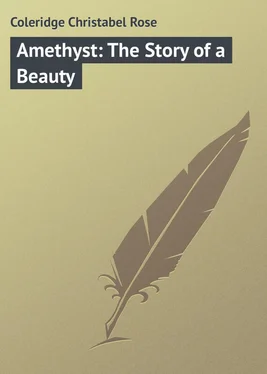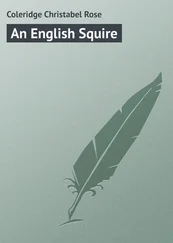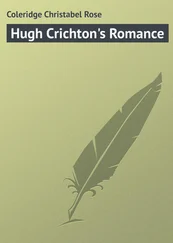Christabel Coleridge - Amethyst - The Story of a Beauty
Здесь есть возможность читать онлайн «Christabel Coleridge - Amethyst - The Story of a Beauty» — ознакомительный отрывок электронной книги совершенно бесплатно, а после прочтения отрывка купить полную версию. В некоторых случаях можно слушать аудио, скачать через торрент в формате fb2 и присутствует краткое содержание. Жанр: foreign_prose, на английском языке. Описание произведения, (предисловие) а так же отзывы посетителей доступны на портале библиотеки ЛибКат.
- Название:Amethyst: The Story of a Beauty
- Автор:
- Жанр:
- Год:неизвестен
- ISBN:нет данных
- Рейтинг книги:5 / 5. Голосов: 1
-
Избранное:Добавить в избранное
- Отзывы:
-
Ваша оценка:
- 100
- 1
- 2
- 3
- 4
- 5
Amethyst: The Story of a Beauty: краткое содержание, описание и аннотация
Предлагаем к чтению аннотацию, описание, краткое содержание или предисловие (зависит от того, что написал сам автор книги «Amethyst: The Story of a Beauty»). Если вы не нашли необходимую информацию о книге — напишите в комментариях, мы постараемся отыскать её.
Amethyst: The Story of a Beauty — читать онлайн ознакомительный отрывок
Ниже представлен текст книги, разбитый по страницам. Система сохранения места последней прочитанной страницы, позволяет с удобством читать онлайн бесплатно книгу «Amethyst: The Story of a Beauty», без необходимости каждый раз заново искать на чём Вы остановились. Поставьте закладку, и сможете в любой момент перейти на страницу, на которой закончили чтение.
Интервал:
Закладка:
“You can’t help Amethyst getting to know things,” said Tory in her slowest drawl; but she gave in, and swung herself off the end of the sofa, calling Kattern to come out in the garden.
Una let herself drop back on the sofa, it was characteristic of her that she never sat upright a moment longer than she could help it, and looked furtively round under her hair at her sister. Amethyst, however, had encountered children before, possessed of a desire to shock their betters, and took Tory’s measure according to her lights; which were to take no notice of improper remarks, especially as Una had shut the little one up so effectually.
“Well, I must go and write to auntie,” she said; “and then shall we go out too, Una?”
“Yes, if you like,” said Una, and with a sudden impulse she put up her face to Amethyst’s, and kissed her.
During the next week or ten days Amethyst was so much taken up with her own family that the various introductions in the neighbourhood made very little impression on her. The result on her mind of these first days of intercourse was curious. She did not by any means think her home perfection. She had indeed been vaguely prepared for much that was imperfect; and she had far too clear and definite a standard not to know that her sisters really were “neglected,” and was too much accustomed to good sense not to be aware that Lady Haredale talked nonsense. But there was a glamour over her which, perhaps happily, softened all the rough edges. Amethyst fell in love with her new “mamma,” and Una conceived a sudden and vehement devotion for the pretty, cheerful, chattering elder sister, who was so unlike any one in her previous experience. Amethyst forgot to criticise what her mother said or did, when the way of saying it or doing it was so congenial to one who shared the same soft gaiety of nature; and Una, suffering, poor child, in many ways, from the “neglect” of which Tory had too truly spoken, followed all Amethyst’s suggestions, and clung to her with ever-increasing affection.
A lady was recommended by Miss Riddell to come every morning and teach the three girls, and though Amethyst did not exactly share in the lessons, she talked about them, and helped in the preparation of them, and made them the fashion, and Tory at least began, as she had said, to find education interesting. This home-life went on as a background during all the ensuing weeks, when outer interests began to assert themselves, and the flood of life for Amethyst rolled on fast and full.
But all along, and at first especially, there were many intervals filled up with teaching her sisters the delights of country walks and primrose-pickings; with reading her favourite books to them, stirring them up about their lessons, and, all unintentionally, in giving them something else to think of than the vagaries of their elders’ life.
A “school-room” had really been provided for them, high up in one of the corners of the house, with a window in its angle which caught the sun all day, and looked over the pretty, rough open country in which Cleverley lay. Here, with flowers and books and girlish rummage, was the most home-like spot the Haredale girls had ever known; and here late one sunny afternoon lounged Una, curled up in the corner of an old sofa – doing, as was still too often the case, absolutely nothing.
Suddenly a light step came flying up the stairs, and Amethyst ran into the room, and stood before her in the full glory of the early evening sunlight, saying in her fresh girlish voice —
“Look, Una – look!”
Amethyst was already in her white dinner-dress, and round her neck was clasped a broad band of glowing purple jewels. Stars of deep lustrous colour gleamed in her hair and on her bosom, her eyes shone in the sunshine, which poured its full glory on her innocent eager face, which in that clear and searching light seemed to share with the jewels a sort of heavenly radiance, a splendour of light and colour from a fairer and purer world.
“Amethyst,” exclaimed Una, starting up, “you look like an angel.”
Amethyst laughed, and stepping out of the sunlight, came and knelt down by Una’s side; no longer a heavenly vision of light and colour, but a happy-faced girl, decorated with quaint and splendid ornaments of amethysts set with small diamonds.
“Mamma says that she has given me my own jewels. She says she was so fond of these beautiful stones that she made up her mind to call me after them, and I am to wear them whenever I can. Aren’t they lovely?”
“Yes,” said Una; “I didn’t know my lady had them still. They’re just fit for you.”
Amethyst took off the splendid necklet, and held it in her hands.
“They’re too beautiful to be vain of,” she said, dreamily. “It’s rather nice to have a stone and colour of one’s own. I used to think amethysts and purple rather dull when we chose favourites at school. Amethyst means temperance, you know. It’s a dull meaning, but I expect it’s a very useful one for me now.”
“Why, what do you mean?” said Una.
“Well!” said Amethyst, “I do enjoy everything so very much. I feel as if music, and dancing, and going out with mother, and having pretty things to wear, would be so very delightful. So if the most delightful things of all remind me that I mustn’t let myself go, but be temperate in all things, it ought to be getting some good out of the beauty, oughtn’t it?”
Amethyst spoke quite simply, as one to whom various little methods of self-discipline were as natural a subject of discussion as various methods of study.
“I hope you’ll never look different from what you did just now,” said Una, in a curious strained voice, and laying her head on her sister’s shoulder; “but it’s all going to begin.”
“Why, Una, what is it?” as the words ended in a stifled sob. “Headache again? You naughty child, I’m sure you want tonics, or sea air, or something. And I wish you would let me plait all this hair into a tail, it is much too hot and heavy for you.”
“Oh no, no! not now,” said Una, now fairly crying, “not just now – let it alone. I don’t want to be grown-up!”
“A tail doesn’t look grown-up,” said Amethyst in a matter-of-fact voice. “Any way there’s nothing to cry about. If you want to come down and see the people after dinner, you must lie still now and rest. But you ought to go to bed early, and get a good-night. When people cry for nothing, it shows they’re ill.”
“I dare say it does, but I’m not ill,” said Una.
“Then you’re silly,” said Amethyst, with cheerful briskness; but Una did not resent the tone. She gave Amethyst a long clinging kiss, and then lay back on the sofa; while her sister went off to arrange the jewels to her satisfaction, in preparation for the first state dinner-party at which she was to make her appearance.
Chapter Six
Historical Types
“Well, father – how goes the world in Cleverley? How are you getting on with the charming but undesirable family at the Hall, of whom Aunt Meg writes to me?”
Sylvester Riddell and his father were walking up and down the centre path of the Rectory kitchen-garden, smoking an after-breakfast pipe together, between borders filled with tulips, daffodils, polyanthuses, and other spring flowers, behind which espaliers were coming into blossom, and early cabbages and young peas sprouting up in fresh and orderly rows. The red tower of the church looked over a tall hedge of lilac trees, and beyond was the little street, soon leading into fields and open, prettily-wooded country, rising into low hills in the distance.
Sylvester had just arrived for a few days’ visit from Oxbridge, where he had recently obtained a first-class, a fellowship, and an appointment as tutor of his college. His father and grandfather had both been scholars, and such honours seemed to them almost the hereditary right of their family.
Читать дальшеИнтервал:
Закладка:
Похожие книги на «Amethyst: The Story of a Beauty»
Представляем Вашему вниманию похожие книги на «Amethyst: The Story of a Beauty» списком для выбора. Мы отобрали схожую по названию и смыслу литературу в надежде предоставить читателям больше вариантов отыскать новые, интересные, ещё непрочитанные произведения.
Обсуждение, отзывы о книге «Amethyst: The Story of a Beauty» и просто собственные мнения читателей. Оставьте ваши комментарии, напишите, что Вы думаете о произведении, его смысле или главных героях. Укажите что конкретно понравилось, а что нет, и почему Вы так считаете.












